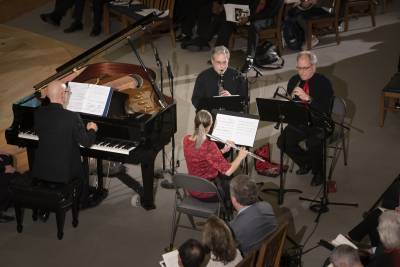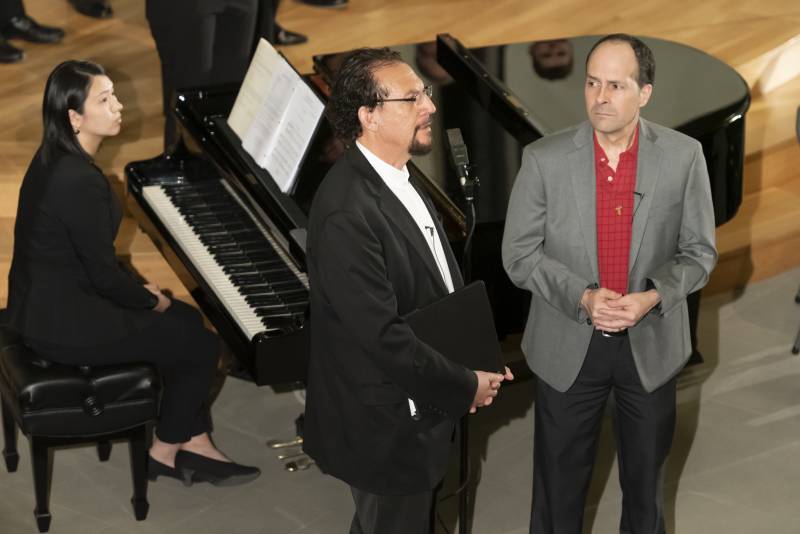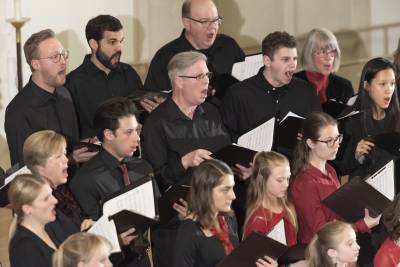Watch the full evening of music and conversation.
On March 29, Duke Initiatives in Theology in the Arts (DITA) at Duke Divinity School hosted an evening of music and conversation to reflect on the lives and legacies of martyrs, focusing on the stories of Lin Zhao, a Chinese dissident during the Mao era, and Rufina Amaya, the sole survivor of the El Mozote massacre in El Salvador.
A Martyr in Mao's China
The first half of the “Performing Faithfully: Music & Martyrdom” event featured the world premiere of Elegy, commissioned by Duke Divinity from Lu Pei, a composer and professor of composition. Jeremy Begbie, Thomas A. Langford Distinguished Professor of Theology and director of DITA; Xi Lian, professor of world Christianity; and Lu introduced the piece and the story behind it.

Elegy was composed in response to the story of Lin Zhao, who was also the subject of Duke Divinity Professor Xi Lian’s book Blood Letters: The Untold Story of Lin Zhao, a Martyr in Mao’s China.
Lin (1932-1968) was the only known Chinese citizen to openly and unwaveringly oppose communism under Mao during the Cultural Revolution. Her dissent was rooted in her Christian faith, and while in prison she used her own blood to write about what was happening to her country. Eight years later she was executed. Lian’s book is the first biography of Lin in English and was called “one of the most important books on the Communist-era rights movement to be published in recent years” by The New York Review of Books.
In Lu's composition, faith battles against the forces of evil. The music uses moments of dissonance contrasted with soft, ethereal chords and references to Passacaglia in C minor by J.S. Bach and Samuel Barber’s “Adagio for Strings” to evoke the harshness of Lin's imprisonment and the divine mercy and redemption that sustained her.
Watch Begbie Introduce the Music in "Elegy"
Elegy was performed by Jeremy Begbie, Thomas A. Langford Distinguished Professor of Theology and director of DITA, on the piano, along with three members of the Boston Symphony Orchestra: John Ferrillo (oboe), Elizabeth Ostling (flute), and Bill Hudgins (clarinet).
Martyrs in El Salvador

The second half of the evening featured a conversation with Salvadoran composer Carlos Colón, assistant director for worship and chapel of the Office of Spiritual Life at Baylor University, followed by performances of three of his works: Veo Violencia en la Ciudad, composed in celebration of the canonization of Óscar Romero; Requiem: Las Lamentaciones de Rufina Amaya, inspired by a survivor of the El Mozote massacre; and Vencerá el Amor, a choral work to commemorate the 1989 martyrdom of six Jesuit priests and two women in El Salvador. Colón was also interviewed by Edgardo A. Colón-Emeric, the Irene and William McCutchen Associate Professor of Reconciliation and Theology at Duke Divinity School, who recently wrote a book on Óscar Romero, Óscar Romero’s Theological Vision: Liberation and the Transfiguration of the Poor.
[Learn more about Carlos Colón.]
Colón’s Veo Violencia en la Ciudad celebrates the 2018 canonization of Óscar Romero, the former Archbishop of San Salvador who was assassinated as he celebrated Mass in El Salvador nearly four decades ago. Romero is considered one of the founders of liberation theology, which interprets the biblical scriptures through the plight of the poor.

Colón’s Requiem was inspired by the courageous witness of Rufina Amaya, the sole survivor of the El Mozote massacre, when nearly 1,000 civilians—including 533 children—were slaughtered by U.S.-trained troops in and around the village of El Mozote in December 1981.
One of the most haunting stories is that of a young Christian girl who sang praises even after being shot. Amaya’s story was corroborated by former soldiers who participated in the massacre, and El Mozote remains the worst single massacre in Latin American history.
Instrumentalists and singers from around the Triangle, including the Piedmont Players and a girls’ choir, joined the trio from the Boston Symphony for performances of Colón’s work.
Music & Martyrdom was made possible with the generous support from the Office of the Vice Provost for the Arts at Duke University through a Collaboration Development Grant, and was co-sponsored by the Duke Department of Music, the Department of Asian and Middle Eastern Studies, and the Asian Pacific Studies Institute.